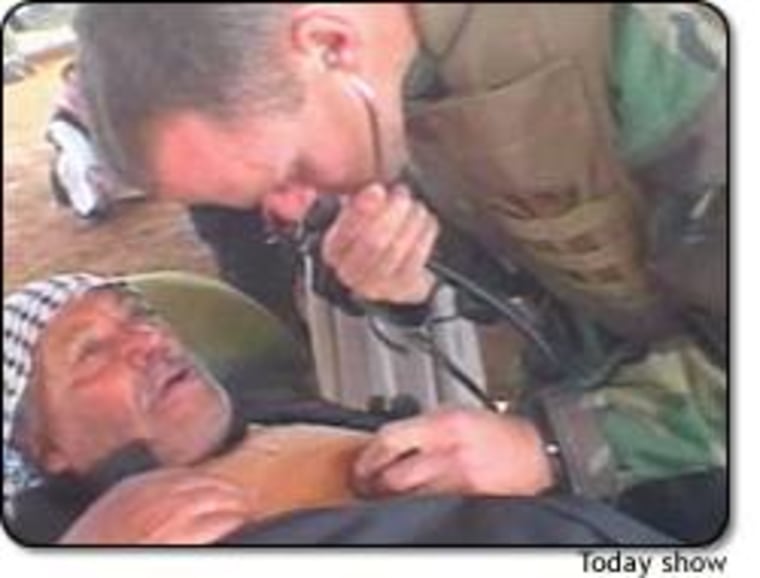While U.S. and British forces have shown their military superiority in Iraq, they’ve had less success winning the support of Iraqi civilians. That was the mission of a U.S. Marine Corps convoy early Tuesday, to a small town in central Iraq.
The 3rd Battalion, 5th Regiment of the 1st Marines Division left shortly before dawn, loading up a convoy with medical supplies and food and heading for a nearby Iraqi town whose name we cannot reveal.
Both the Marine and Navy medical personnel in the convoy, and a group of 100 heavily armed Marines sent to guard them, were wary of what they would find. Over the past week, as the Marines’ column has slowly moved north toward Baghdad, they have been hit hard by Iraqi attackers, many of them wearing civilian clothing and mingling with women and children. And reports of attacks by suicide bombers have the Marines on edge.
The convoy’s commander, Lt. Col. Carl Mundy, told us he did know what to expect.
But as the column got closer to the town, it was obvious that the Iraqis themselves were very frightened of the Marines’ approach. Through an interpreter, the townspeople explained that the local Baath Party officials, who had left the area a few hours earlier, had told them that the Americans would kill all males between the ages of 18 and 40.
Once Mundy explained that the Marines were there to offer food and medical aid, the Iraqis seemed immensely relieved.
The Marines set up an area for the doctors and Navy corpsmen to treat patients and they saw between 200 and 300 Iraqis, most of whom had relatively minor problems such as skin or eye infections. There were no signs in the patients of any recent war injuries.
The Marines also distributed boxes of food. Lots of Iraqis were waving and as far as we could tell, the Marines got a warm reception. “The people seem to be happy that we are here,” Mundy said. “The kids are running around looking for candy.”
U.N. WILL SHIP FOOD TO KURDS
Elsewhere in Iraq, the U.N. food agency said it would ship flour through Turkey into northern Iraq to feed the Kurdish population there, while U.S. and British forces struggled to clear mines from a channel into the port of Umm Qasr to allow more humanitarian aid to enter Iraq from the south.
The World Food Program will send 1,100 tons of wheat flour on 60 trucks to northern Iraq on Wednesday from a warehouse in the southeastern city of Gaziantep, spokeswoman Heather Hill said Tuesday.
The agency sent 85 tons of powdered milk to the region from Turkey on Saturday.
Thousands of Iraqi Kurdish residents have left cities and front-line towns to move toward the Turkish and Iranian borders, according to Iraqi Kurdish officials.
Hill said the food shipments would be distributed near the northern Iraqi cities of Irbil, Dohuk and Sulaymaniyah.
The agency has been stockpiling food in countries bordering Iraq to feed 900,000 refugees for 10 weeks. Tons of high-energy biscuits, chickpeas and vegetables oil are ready for shipment from Turkey.
The United Nations appealed Friday for $2.2 billion in emergency aid for Iraqis — more than half of that money to be used in the six months after the war to feed most of Iraq’s 24 million people.
STILL ‘WORK TO DO’
Far to the south, in the strategic port of Umm Qasr, ships, divers, helicopters and dolphins were attempting to clear the waters of mines that blocked aid shipments.
The first boatload of supplies arrived last week at Umm Qasr, but a naval officer acknowledged Monday that navigating the surrounding waterways still poses dangers to regular aid convoys.
“There’s still a lot of work to do,” said Royal Navy Cmdr. Brian Mair, one of the officers heading up the U.S.-led coalition’s mine-clearing efforts. “If you don’t want mistakes and accidents to happen, you have to be slow and methodical.”
Clearing a safe path to Umm Qasr is key to securing southern Iraq and creating a foothold for the rest of country. It is Iraq’s only deep-water port, and coalition forces hope to make it the center for distributing humanitarian relief.
In prewar days, Umm Qasr was the main entry point for supplies bought through the U.N.-administered Oil-for-Food Program. An estimated 3 million tons of grain, 1 million tons of dry foods, and 750,000 containers came through the port every year.
War has now disrupted that flow and aid agencies are warning of a potential humanitarian crisis in Iraq, where a dozen years of economic sanctions have left some 60 percent of the country’s 27 million people dependent on government rations.
CLEARING THE MINES
Before the shipments to Umm Qasr can resume, however, the treacherous Khor Abdallah channel, leading from the Persian Gulf to the port, must be completely swept of boat-sinking mines.
British, American and Australian clearing teams have already been at it for more than a week. So far, they have largely cleared a 400-yard-wide path along the 40-mile-channel. The British supply ship RFA Sir Galahad docked there last Friday and unloaded the first military shipment of relief aid — 100 tons of water and 150 tons of rice, lentils, cooking oil, tomato paste, chick peas, sugar, powdered milk, and tea.
But Mair said it would be “some time” before the port can be considered safe, stressing that it is probably impossible to ensure that all mines have been cleared. The coalition’s aim is to clear 90 percent of the mines, he said.
(Chip Reid is an NBC News correspondent traveling with the 1st Marine Division in Iraq. The Associated Press and Reuters contributed to this report.)
